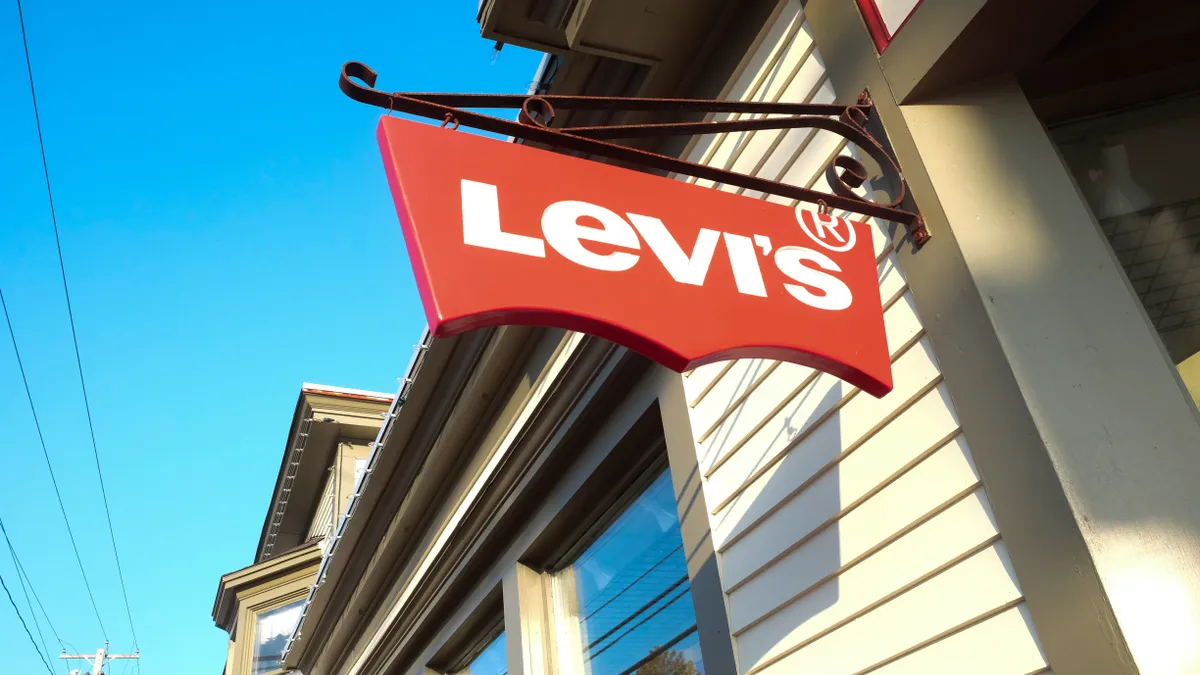Dive Brief:
-
Levi's this week said it is expanding sales of its premium Red Tab merchandise to 500 Target stores by the end of next year and has also returned its budget Denizen line to the mass merchant's racks. The Red Tab effort debuted a little over a year ago in about 50 Target stores.
-
The iconic denim maker also launched a partnership with Dick's Sporting Goods to sell its "better assortment" online and in 11 stores, at a "significantly higher" average wholesale price point, CEO Chip Bergh told analysts, according to a Motley Fool transcript.
-
The company is also expanding its own footprint, with plans to add 100 of its smaller U.S. locations to the 30 it runs now, some of which will be its "NextGen" stores offering custom services, he said. The company runs about 200 stores in the U.S., according to a note from Jane Hali & Associates.
Dive Insight:
Levi's is being careful with its new wholesale partnerships, with Bergh emphasizing that the assortments available through Target and Dick's are highly curated. But the company made it clear that, despite meaningful growth in direct sales to customers, it values the wholesale channel.
"We are selectively pursuing additional wholesale distribution expansion," Bergh said. "We believe these strategies will support future growth as well as our goal to elevate the brand in the market. And we continue to gain space within the top doors of existing customers, leveraging our expanded lifestyle portfolio and the strength of our brand to drive traffic. By focusing on their most productive doors, we seek to mitigate the impact of the inevitable closures of underperforming doors in the future."
In a move that may demonstrate that unlike many department stores, Target is able to reach customers across income groups, Levi's is bringing back its lower-priced Denizen jeans to the mass retailer, after determining that it wouldn't cannibalize sales of the dearer Red Tab items.
"[W]hen we first started testing Target, with the Levi's Red Tab business, we pulled Denizen out of the store, and to make room for Levi's and collectively, we concluded that was a bad idea," Bergh also said. "We went back. We tested Denizen back in those same doors and it proved that these are two different consumers."
The new efforts represent yet more damage to department stores, which are increasingly waving goodbye to a diverse set of brands seeking to bypass the sector's penchant for promotions. "We believe the company's relationship with high performing retail segments, such as off-mall/value-based will help offset declines in the traditional department store channel," Jane Hali analysts said in emailed comments, noting that in addition to Target and Dick's, Levi's has forged relationships with Kohl's, Macy's, Walmart and Amazon.
News of the expansions came on a day when Levi's reported a 27% year-over-year decline in third quarter net revenues, and a 78% drop in net income, which landed at $27 million, all blamed on the pandemic. Wholesale revenues declined 29% and direct-to-consumer revenues declined 22%, but the company did see a 52% increase in its own e-commerce business, according to a company press release. Its stores provided 29% of its net revenue in the quarter, with e-commerce chipping in 8%.
And e-commerce has been in the black, according to Chief Financial Officer Harmit Singh. "Our e-commerce business on a fully allocated basis was again profitable in the third quarter and year-to-date," he said. "And we expect full year profitability in 2020 a year ahead of schedule."















